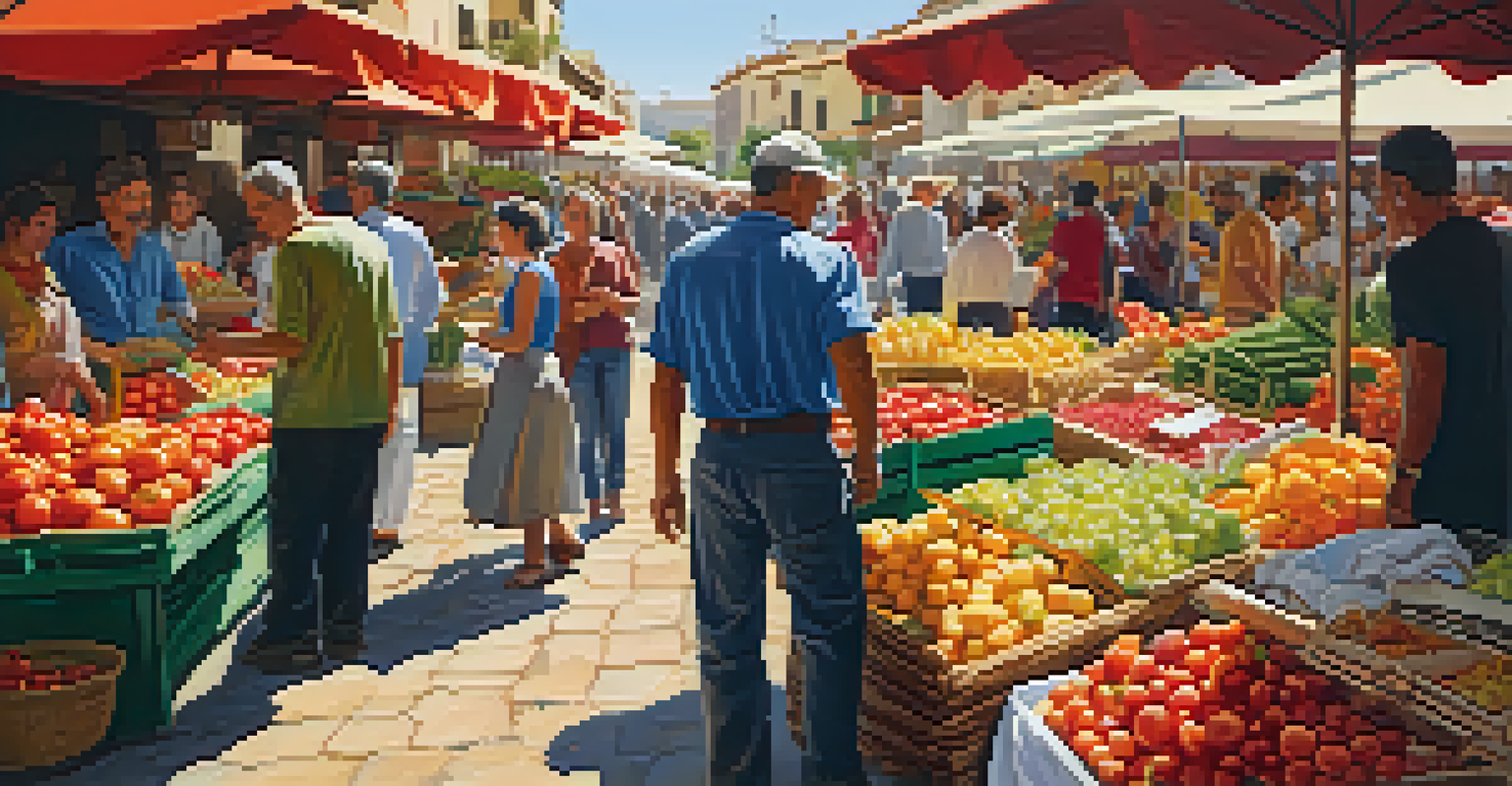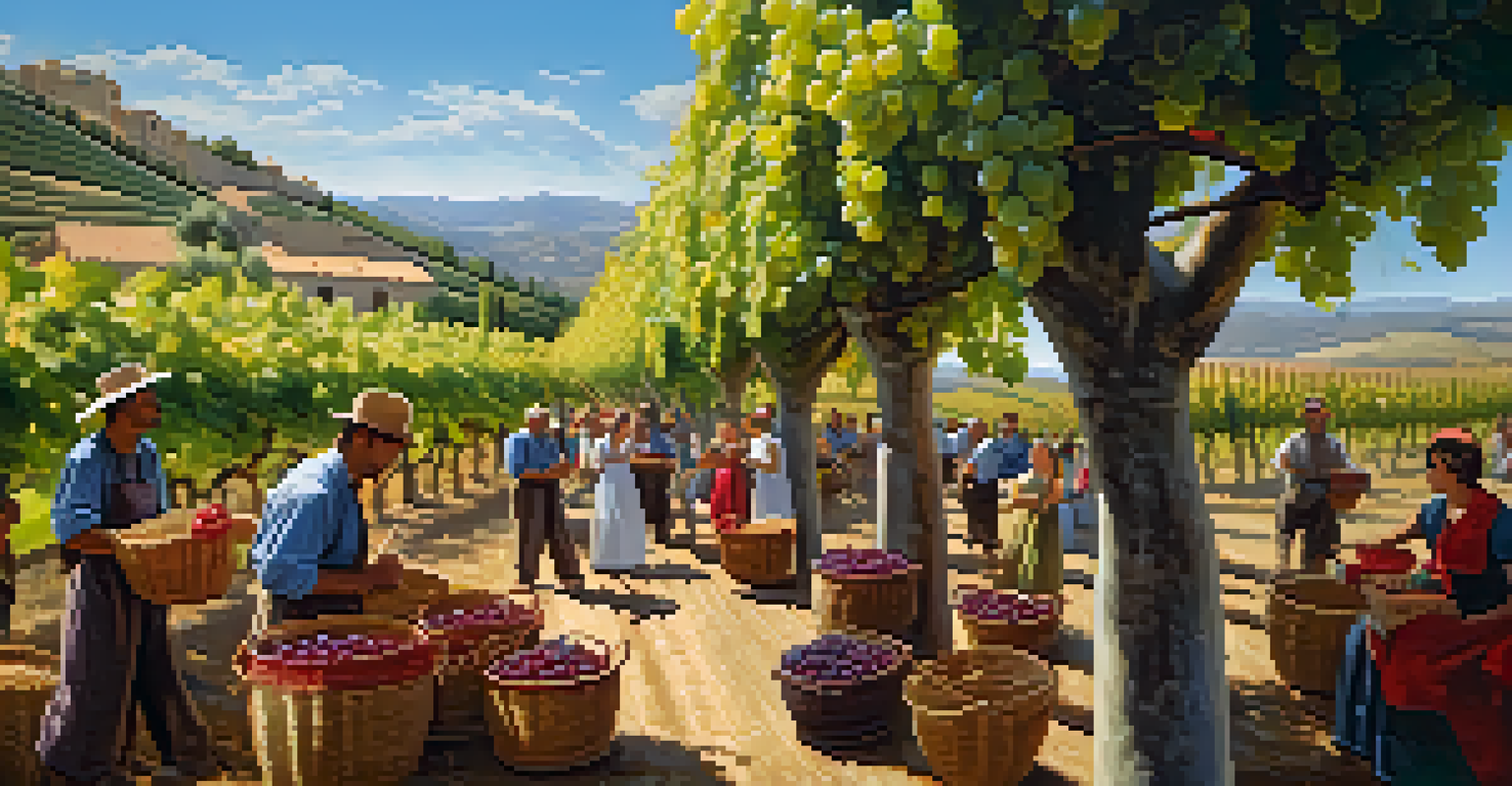Cultural Insights: Traditional Farming Practices in Spain

The Historical Roots of Farming in Spain
Spain’s agricultural practices are deeply rooted in its history, dating back to ancient civilizations. The Iberians, Celts, and Romans all contributed to the evolution of farming techniques. Each culture introduced unique crops, tools, and methods that have shaped Spanish agriculture over millennia.
Agriculture is our wisest pursuit, because it will in the end contribute most to real wealth, good morals, and happiness.
The introduction of irrigation by the Moors in the 8th century was a game changer, allowing for the cultivation of arid lands and the growth of diverse crops. This innovation not only transformed the landscape but also laid the groundwork for Spain’s reputation as a leading agricultural nation.
Today, many of these historical practices are still evident, as farmers continue to use methods passed down through generations. This blend of history and tradition enriches the cultural fabric of Spain, making its farming practices uniquely fascinating.
Key Crops and Their Cultural Significance
Spain is renowned for its diverse array of crops, including olives, grapes, and tomatoes. Each of these crops not only serves a culinary purpose but also holds cultural significance, often tied to local festivals and traditions. For instance, the olive harvest is celebrated with festivals that highlight the importance of olive oil in Spanish cuisine.

Wine production, particularly in regions like La Rioja, is another key aspect of Spanish agriculture. The celebration of the grape harvest, known as 'la vendimia,' brings communities together to honor their viticultural heritage through music, dance, and, of course, wine tasting.
Historical Roots Shape Farming Today
Spain's agricultural practices have evolved through centuries, influenced by various civilizations and their unique farming techniques.
Additionally, the cultivation of saffron in La Mancha showcases how specific crops can symbolize regional identity. Saffron harvesting is a time-honored practice that has been celebrated for centuries, emphasizing the deep connection between agriculture and cultural pride.
Sustainable Practices in Traditional Farming
Sustainability is a growing concern in farming worldwide, and Spain is no exception. Many traditional farming practices emphasize harmony with nature, utilizing methods that have minimal environmental impact. For example, crop rotation and organic farming techniques are commonly employed to maintain soil health and biodiversity.
The land is the only thing in the world that amounts to anything, for 'tis the only thing that lasts.
In regions like Andalusia, farmers are increasingly adopting permaculture principles, which focus on creating self-sustaining agricultural ecosystems. This not only benefits the environment but also helps preserve traditional knowledge and techniques that have been used for generations.
The commitment to sustainability is also reflected in the popularity of local markets where farmers sell their organic produce directly to consumers. This strengthens community ties and fosters a greater appreciation for the land and its resources.
The Role of Women in Spanish Agriculture
Women have played a vital role in traditional farming practices in Spain, often managing family farms and contributing significantly to agricultural output. Historically, their involvement has been underappreciated, yet many women have preserved traditional methods and passed them down to future generations.
In recent years, there has been a resurgence of recognition for women in agriculture, with initiatives aimed at empowering female farmers. These programs focus on providing training and resources, helping women to take on leadership roles in the agricultural sector.
Crops Connect Culture and Community
Key crops like olives and grapes are not only central to Spanish cuisine but also integral to local traditions and festivals.
As a result, many women are now at the forefront of sustainable farming practices, advocating for organic methods and community-supported agriculture. Their contributions are reshaping the narrative around farming in Spain, highlighting the importance of inclusivity in this vital sector.
Festivals and Celebrations of Agricultural Heritage
Spain's agricultural practices are closely tied to its vibrant festivals, which celebrate the changing seasons and the harvest. Events like the Tomatina in Buñol and the Féria del Caballo in Jerez showcase the importance of agriculture in Spanish culture, bringing communities together in celebration.
These festivals often feature traditional music, dance, and food that highlight local produce. They serve not only as a way to celebrate the harvest but also as a platform for preserving cultural identities and promoting regional products.
Moreover, these events attract tourists, boosting local economies and raising awareness about the importance of traditional farming practices. Through these celebrations, the connection between agriculture and culture is beautifully illustrated.
Regional Variations in Farming Practices
Spain’s diverse climate and geography result in a rich tapestry of regional farming practices. From the coastal vineyards of Galicia to the olive groves of Andalusia, each area has developed unique methods suited to its specific environment. This regional diversity not only influences the types of crops grown but also the culinary traditions that arise from them.
For instance, in the Basque Country, fishing and farming are intertwined, with seafood and local produce playing a significant role in traditional dishes. This showcases how the land and sea together shape the culinary landscape of a region.
Sustainability Amid Modern Challenges
Traditional farming methods in Spain are increasingly focused on sustainability, despite facing pressures from urbanization and climate change.
Additionally, regions like Catalonia emphasize the importance of heirloom crops, preserving varieties that have been cultivated for centuries. These regional farming practices contribute to Spain’s rich agricultural heritage, reflecting the intricate relationship between culture and the land.
Challenges Facing Traditional Farming Today
Despite its rich traditions, Spanish agriculture faces numerous challenges today. Factors such as climate change, urbanization, and globalization threaten to disrupt traditional farming practices. Many farmers struggle to compete with large-scale industrial agriculture, which can undermine local economies and traditional methods.
Additionally, younger generations are increasingly moving to urban areas for better opportunities, leaving behind the land and the skills needed to sustain traditional practices. This shift raises concerns about the future of Spain's agricultural heritage and the preservation of its cultural identity.

However, there is a growing movement among young farmers to revitalize traditional practices, often blending them with modern techniques. This innovative approach aims to create a sustainable future for agriculture in Spain, ensuring that its cultural insights continue to flourish.